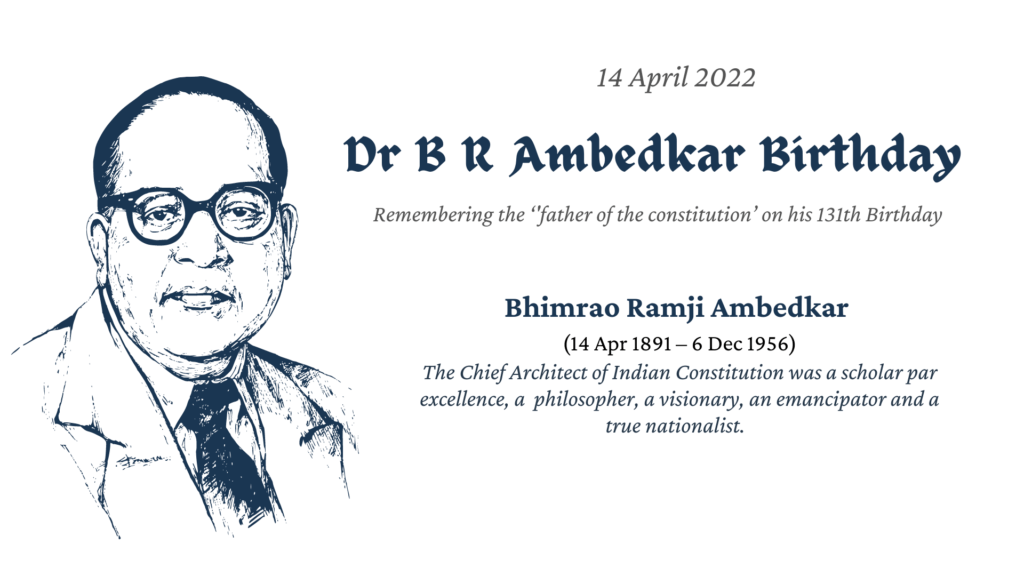
Remembering the “father of the constitution” on his 131st Birthday today.
Bhimrao Ramji Ambedkar (14 Apr 1891 – 6 Dec 1956)The Chief Architect of Indian Constitution was a scholar par excellence, a philosopher, a visionary, an emancipator and a true nationalist.
“Cultivation of mind should be the ultimate aim of human existence.”
Dr.B.R.Ambedkar

Dr.B.R.Ambedkar was a post-graduate of Columbia University (U.S.) and obtained his doctoral degree in economics from there in 1917 and D.Sc. degree in 1921 from the renowned London School of Economics.The Problem of Rupee is 257-page long paper written by Dr. B. R. Ambedkar that he presented as his Doctoral thesis at the London School of Economics (LSE) in March 1923. In it, Ambedkar tried to explain the troubles that were associated with the national currency of India – the Rupee. He argued against the British ploy to keep the exchange rate too high to facilitate the trade of their factory products.
Dr B R Ambedkar on Agriculture reforms in India
Present time of globalization agriculture growth rates in not also only stagnant but also indicates continuous declining trends. The government has concentrated only on the technical problems and thus ignored institutional. The sub division, land reform and size distribution of ownership holding is the main obstacle in development of agriculture sector. This calls a deep study to accelerate the growth rate of agriculture sector. So India needs to make appropriate change in this agricultural plan. The productivity of Indian agriculture sector is very low compared to many developed countries and there is need to take measures on the basis of Ambedkar’s economic thoughts.
Land Holding : Ambedkar was the first Indian economist to examine the problem of sub -division and fragmentation of agricultural land holdings and formulate a very scientific definition of an economic holding. Ambedkar opined that small size of land holding is one the causes of production. Therefore should be consolidation of land holding. The traditional definition of an economic holding was presented as “a chance of producing sufficient to keep himself and his family in reasonable comfort after paying his necessary expenses”.
It cannot be the language of economics to say that a large holding is economic while a small holding is uneconomic. It is the right or wrong proportion on others factors of production to a unit of land that renders the latter economic or uneconomic. A small term may be economic or uneconomic because economic does not depend upon the size of land but upon the appropriate proportion among all factors including land.
It is clear that after independence the average size of holding has continuously declining trend. The main reason for decline is burden of population on land, defective law of inheritance, the decay of cottage industries etc. 1970-71. India being a second populated country in world facing many problems related with each sector of economy, as in agriculture we are facing low productivity rate and high dependency ratio without any technical improvement, what lies behind this cause are backed by number of factors, one of them is fragmented land with low share of holding, so there is urgent need to introduce corporative and collective farming throughout the country based on Dr. Ambedker thought who was against this fragmented holding system. As the study reveals that we have increased marginal share holding of 8.98 per cent in 1971 to 18.72 per cent in 2000 and large holding 30.88 per cent to 13.17 per cent in same years which indicated the large share holding in India decreases year after year having related pace of decreasing also in semi median and median type of holding. Similarly average size of holding in India during 1970-71 was 2.30 and now the average size of holding comes down to 1.16 in 2015-16. Analytically we can say the marginal share of agriculture holding is increasing in an increased rate, Dr Ambedker was against this low share holding and suggests there is an urgent need for reform in agriculture sector included with corporative farming and formulation of corporative societies for the development of our agriculture sector with high productive rate and low factor inputs.
State Socialism and Agriculture: B.R. Ambedkar propounds the concept of state socialism. This concept envisages the collective farming. With abolition of intermediaries, the state must be the owner of land. The state should distribute these lands to the farms. Farmer should cultivate the farm collectively. The state should supply essential capital to the agricultural sector and the obtained income should be distributed among the farmers. It will lead to solve the problem of agriculture labours.
Land Revenue: Ambedkar criticized the land revenue of British government. According to him, land revenue system was in against of the interests of poor people of India. Further no justice or equality was there in tax policy. He said that, land revenue was highly oppressive. Bharat Ratan Ambedkar emphasized the point that it was unjust to assess the land point that it was unjust to assess the land revenue on the income. The rate of assessment did not depend on the capacity to pay the tax. The taxable capacity was enhanced with the growth in the income. After independence the government has continued the existing land revenue system in the country.
Some states have adopted agricultural income tax, but yet not covered all other states in the country. Agricultural sector may be one of important tax base of the country. It must be covered unified system of taxation of agriculture and non agriculture sector.
Approaches towards land reform: In a paper titled ‘Small holdings in India and their Remedies published in Journal of Indian Economic Society, Ambedkar opined that consolidation may prevent the evils of scatter holdings but nor the evils of small holdings under the consolidated holdings was an economic holding. The traditional definition of an economic holding is “a holding which allows a man a chance of producing sufficient to keep herself and his family in reasonable comfort after paying his necessary expenses” was criticized by him. He pointed out that this definition of economic holding was from standpoint of consumption rather than from the viewpoint of production. Because consumption is worth correct standard by which economic character of holding can belong. It would be perverse accounting to condemn a farm as not paying because its total output does not support the family of a farmer through as a pro-rate return for each of his constituents it is the highest. He remarked, “Any definition, therefore, that leans on consumption returns the nature of an economic holding which is essentially an enterprise in production what is important for the purpose of production is the process of combining the factor of production.”
It is true that the absolute size of land (which was small) was not the only decisive factor responsible for efficient production. It can’t be the language of economics to say that a large holding is economic while a small holding is uneconomic. It is the right or wrong proportion of other factors of production to a unit of land that renders the latter economic or uneconomic. A small term may be economic or uneconomic because economic or uneconomic does not depend upon the size of land but upon the appropriate proportion among all factors including land.
An economic holding consists of land and labour in a proportion such that the prorate contribution of each in conjunction with the rest is the highest to create an economic holding, a farmer must have the other instruments of production required for the efficient alteration of his holding and must maintain a due proportion of all the factors. Therefore, an economic holding is not a matter of the size of hand alone but is a matter of the adjustment of a piece of land to the necessary equipment for its efficient cultivation.
“The existing holding is uneconomic, not, however, in the sense that they are too small but that they are too large…… . Consequently, the remedy for the ills of agriculture in India does not lie primarily in the matter of enlarging holdings but in the matter of increasing capital and capital goods”
Low Capital Formation: In view of Ambedkar, capital arises from savings and that saving is possible where there is surplus. In fact, no surplus is possible in Indian agriculture because in spite of the vastness of land under tillage, a large agricultural population with the lowest proportion of land in actual cultivation meant that a large part of agricultural population remained idle instead of performing any sort of productive labour. The economic effort of this idle labour is that it creates tremendous amount of pressure on land. This enormous pressure is the main reason of the sub-division of land resulting in the increasing rural area of the country. He opined “It is the failure to grasp the working of this pressure on land that makes the law of inhabitance such a great grievance”.
Consolidation of holdings: According to Ambedkar, the evils of small holding in India was not fundamental but was derived from the parent evil of the mal-adjustment in her social economy. The remedy for preventing sub-division & fragmentation was consolidation of holdings but under the existing social economy, it will not be expected to bring relief, he said “Instead it will serve to be a legal eyewash”.
After the adoption of the one-man rule of succession, a survey number would be made to cover a piece of land which will be of the size fixed for an ideal economic holding. A piece of land with a separate a distinct survey number must not be below the economic limit. This survey number covering a piece of land large enough to be styled economic will be registered in name of one person. The one-man rule of succession to a consolidated holding means refusal to recognize legally a piece of land if it were below a certain size. This refusal to recognize smaller piece of land will prevent the sub-division of a consolidated holding. Such was the idea of an economic unit propounded by Ambedkar. According to him consolidation and its conservation were so intimately connected that one could not be thought of without the other. Ambedkar in his paper describes how agriculture improves by the reflex effects of industrialization. He summed up
“Industrialization of India is the soundest remedy for the agricultural problems of India. Industrialization facilitates consolidation. It lessens the premium on land. It must precede consolidation. It is an effective barrier against future sub-division and fragmentation of a consolidated holding”.








